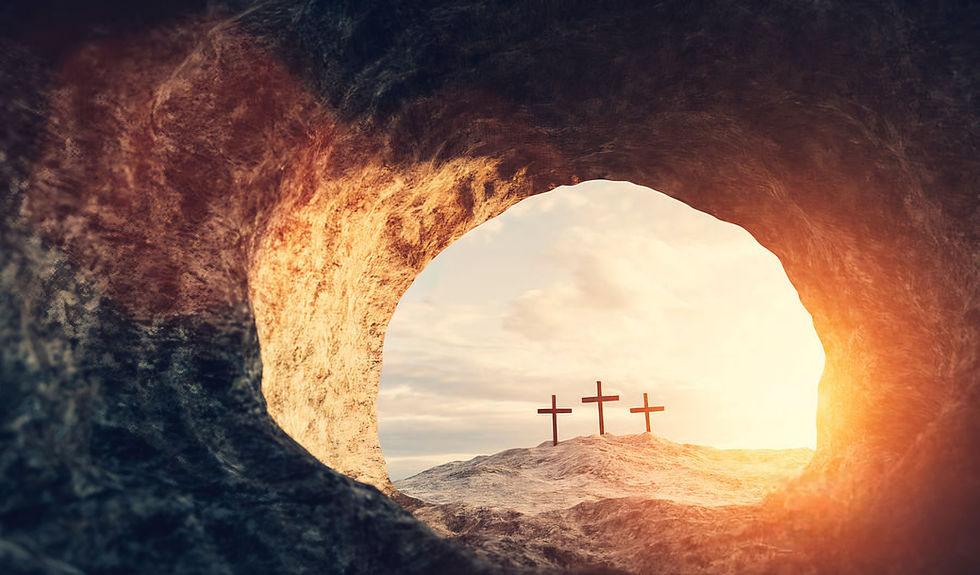Thoughts on the Sower
- Crossfire

- Oct 16, 2022
- 7 min read

Listen! A man once went out to sow his seed and as he sowed, some seed fell by the roadside and the birds came and gobbled it up. Some of the seed fell among the rocks where there was not much soil, and sprang up very quickly because there was no depth of soil. But when the sun rose, it was scorched, because it had no root, it withered away. And some of the seed fell among thorn-bushes and the thorns grew up and choked the life out of it, and it bore no crop. And there was some seed which fell on good coil. And when it sprang up and grew, produced a crop which yielded thirty or sixty or even one hundred times as much seed. And then He added, “Every man who has ears should use them.”
Mark 4:1-8 (Matthew 13:3-9; Luke 8:5-8)
Why might the Parable of the Soil be included in Matthew, Mark and Luke in an almost identical manner, each including Jesus’ explanation of the symbolism?
Perspective – Writer One
Although this parable is usually referred to as the Parable of the Sower, the question could arise as to whether it might also be called the Parable of the Soil. There is no doubt as to the identity of the seed. In the three synoptic gospels, the parable is related in an almost identical manner and its explanation of the seed does not vary. The seed is the gospel, the Word of God. In the same way, the soil is the same in all three gospels. Jesus describes the differences in the soil into which the sower indiscriminately tosses the seed. (Matthew 13:18-23; Mark 4:14-20; Luke 8:11-15) First, the hard soil by the roadside, easily attacked by Satan, the second the stony ground which could not develop roots and withered in the heat of the temptations of the day, the third among thorn bushes – flourishing but forgotten in the joys and worries of life, and finally in good soil which provided a generous harvest.
While this would explain different reactions to the gospel, might it also call a sower to responsibility? Do we, who have the seed, have the obligation to prepare the soil, to understand the difficulties of the world to accept the Word, and work to loosen the soil, to remove the rocks and torn bushes, and provide water to make the return even greater?
Perspective – Writer Two
As the sower sows, he comes across different types of soil. Most gardeners would not throw their seed onto ground that is certain to hinder or prevent growth but in the parable, the sower continues to sow His seed with no regard for the soil at His feet. He doesn’t change the seed based on the soil and he doesn’t stop sowing the seed. He just continues on His path and throws the seed on all the various terrains he comes across.
Drawing a parallel between Jesus and the Sower, we see Jesus’ methods are much the same. He persists in telling the Jewish people the Truth that God has sent Him to tell. Just as in the Old Testament, God through His prophets relentlessly told the people of Israel and Judah of God’s desire to be in a relationship with them. In Isaiah 30:18 NLT, God says through His prophet, “So the Lord must wait for you to come to him so he can show you his love and compassion. For the Lord is a faithful God. Blessed are those who wait for his help.”
Our God has never wavered from His desire to be in a relationship with us. It is the condition of our human hearts that block and hinder our receptivity to God’s message of love and hope. Luckily for us, God has not only provided the seed but He has given us the Holy Spirit’s power to break up the bad soil. The prophet Ezekiel prophesied about the new covenant in Ex 36:26:
“And I will give you a new heart, and I will put a new spirit in you. I will take out your stony, stubborn heart and give you a tender, responsive heart.”
God not only promised a new way but He provided His Son and the Holy Spirit to ensure it could happen. However, in the verse above from Isaiah we see that we also have a role to play. God waits on us to come to Him, but we must seek and wait on His help. Only in our seeking His help will we be able to see, hear and understand. As Jesus explains in Matthew 13:11-17, His disciples have been given the ability to hear and understand because their hearts have been humbled. They have understood their need for a Savior to reconcile them to God. Their belief in Him gave them a special ability to understand things of the Kingdom. Many of the hard-hearted people listening to Jesus had not come to a place where they could see their separation from God. They rested on their own “good” acts of piety to earn their way into God’s Kingdom. Their self-reliance and pride closed off their ears from hearing the Lord’s truth and blinded their eyes for seeing His many miracles. In verse 13, Jesus says, “For they look, but they don’t really see. They hear, but they don’t really listen or understand.”
There will be times in our lives on this Earth when we will experience dry ground, rocks that cause us to stumble, thorns that prick us, and weeds that try to choke out our life. Thankfully, none of those things can break our relationship with God unless we allow them to do so. Our Gardener is always there, ready and waiting to tend the soil of our hearts and restore our hearts to Him. We simply have to ask.
“And though the Lord give you the bread of adversity and the water of affliction, yet your Teacher will not hide himself anymore, but your eyes shall see your Teacher. And your ears shall hear a word behind you, saying, “This is the way, walk in it,” when you turn to the right or when you turn to the left.” Isaiah 30:20-21
Perspective – Writer Three
As a parent, I probably tell my children "Listen!" at least once daily. It is something I need to hear at times, too. Jesus opens his teaching in verse 3 with a command to listen. Our attention is mandatory and how we listen to Him really matters. The disciples realized that Jesus was giving them an order and it's evident they listened because the parable and the explanations are nearly identical.
Jesus knew not everyone gathered by the sea would really hear his message. Some were listening without listening, hearing without hearing. It's so easy to do and I'm guilty of it myself. My son will often ask me to repeat back what he just told me. He knows when I'm a million miles away despite standing right in front of him. If we don't want our soil to be hard and dry, we have to "be sober-minded; be watchful. Our adversary the devil prowls around like a roaring lion, seeking someone to devour." (1 Peter 5:8) Satan has a million methods of taking the seed away. He's really good at distracting us from God. The bed sounds better than the Bible. Netflix seems more appealing than nightly prayers.
Others listened and enjoyed the stories that Jesus told. They were enamored with His miracles. Their soil was shallow and rocky. When we treat Him only as the positive and encouraging Jesus who never calls us to commitment, never asks us to deny ourselves and take up our cross and follow Him, it is short-lived and unsustainable.
Many of those gathered listened, but for some, the thorns in their soil choked the seed. Thorns are deep-rooted just like our sinful nature. They are relentless and painful, but they can keep us humble, so we learn to rely on God's grace and His power and glory can be seen through our lives. If we will allow Jesus to be the sower, our soil will be good and we will hear Him the way the disciples did. He will soften the soil, and sow the seed. He can break the hardest ground, root out all the rocks and thorns and prepare the soil to receive the seed. Only through Him can we be fruitful.
"Abide in Me, and I in you. As the branch cannot bear fruit of itself unless it abides in the vine, neither can you bear fruit unless you abide in me." (John 15:4)
Perspective - Writer Four
First Heart Soil – Beaten Path. You hear the word of God and believe, but it doesn't stick with you. You continue living as you were before you heard His word. Back on the beaten path. Nothing grew.
Second Heart Soil – Rocky Ground. You hear His word and believe His word. You begin to grow in Christ but something happens in your life that causes you to let go of your faith instead of holding on and allowing God to help see you through. Tiny Growth.
Third Heart Soil – Thorny Field. You see, hear, and believe but allow so many of life's distractions to get in your way. Your job, money, politics, etc. are the thorns that do not allow you to keep the faith if you let them. Struggling to grow.
Fourth Heart Soil – Good Soil. Nothing else grows here but your heart, your mind, and your soul which is always engaged in Christ's teachings and living the Christian life. This allows you to enjoy the blessing of knowing that He will see you through any old paths where nothing grows, rocky places where nothing lasts, and thorny places that are too crowded and distracting
My heart has been down all four soil paths at one time or another in my life. I recommend Good Soil for all! Thanks be to God for sticking with me in spite of all my prior soil choices!



Comments